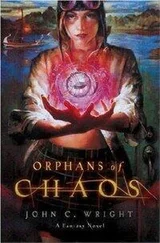On the hilltop beyond this, in the distance, rising above the deodar trees and clinging vines, was an antique temple, shaped like a beehive, but intricately carven with figurines and images. It looked old, perhaps dating back to the Era of the Second Mental Structure. Without access to the Middle Dreaming, Phaethon missed the ability to learn all he might wish to know about anything by glancing at it. But he tried to tell himself to enjoy the mysterious and picturesque character his new-found ignorance bestowed.
Phaethon stepped to the moving staircase in order to descend; but the escalator was loyal to the precepts of the Hortators and would not carry him. So he stepped over to a service ladder leading down. Phaethon did not know if the rusted metal rungs could sustain the weight of his armor; but when he asked the ladder for its specifications, the ladder was either dumb, or deaf, or rude, and it did not answer. Phaethon doffed the armor, and had it rappel down the tower side by itself, while he climbed down the ladder. He did not want to waste his suit material by building another garment, and the clime was warm, and so he walked nude, followed faithfully by his armor.
There was a street leading to the town, made of glassy spun diamond; and a ridge running down the middle had guide-wires and thought-ports, lines and beads of smooth ceramic, glinting in the surface. As far as Phaethon could see, the approaching town was neither cramped nor squalid nor filthy, nor did it have the other earmarks of poverty that the poorer sections of Victorian-Age London (which he had visited many times in simulations) had displayed.
It did not look too bad, he told himself.
But that impression changed the closer he came to the town.
First, the street, which had looked so bright and inviting when he first stepped onto it, turned out to be a low-grade moron. Instead of offering interesting comments about the scenery, or important traveler's tips, or playing restful walking-music, the street had monotonously belabored him, joking and shouting with a mindless and force-fed glee, trying to get Phaethon to use certain commercial services that Phaethon could not have purchased in any case.
Second, the nanomachinery creating and maintaining the street was misprogrammed, so that black carbon dust, not correctly bound in the diamond street surface, accumulated from cracks and breaks. Phaethon, as he walked, found his knees and feet coated with coal-black particles as fine as mist, which no amount of wiping could clear from his leg hairs.
The clamoring street fell silent when he entered the town proper.
Phaethon walked among the giant spiral shells and mother-of-pearl domes of the houses and buildings. Only a few were occupied. The rest were mad-houses or mutants, like something from an old story. The self-replicating machinery that designed and grew these Sixth Era buildings had been neglected, and reproduced with no supervision and no corrections, so that some houses were half-grown into each other, like horrible Siamese twins. Others had lopsided doors or windows; or they grew without doors; or without power or lights; or, worse, with a strange, harsh light painful to the eye.
Some of the buildings were tilted at drunken angles, or sat, slumped and damaged, having made no attempt to heal themselves nor to grow their broken walls shut.
Certain formations, which were easy to grow, such as lamps or doorposts, had flourished like weeds, everywhere. Few were the houses that did not have twenty or a hundred lamps sprouting from their pearly roofs or curling eaves. Doorposts (dotted with jacks and cells to hold identifier plates and call cables which never would be installed) stood unsupported in the center of the street, or clustered in the unplanned gaps between buildings, or hung tilting from second-story lofts.
When Phaethon politely asked a question to one of these neglected houses, the building would giggle idiotically, or repeat some stock phrase parrot-like: "Welcome Home! Welcome Home!"
After a few moments of walking, many of the houses were stirred up in a clamor, shouting, calling back and forth to each other. Some gobbled at him in angry languages; warehouses shrieked; whore-houses called out bawdy slogans. Phaethon kept his eyes ahead and walked stiffly, pretending not to notice.
The houses fell grumbling and mumbling into silence a few moments after he had passed, so that a wake of noise trailed after him.
Then he came into an upper part of the town. There were people here, sitting on porches or lounging lazily along the side of the street. They were dressed in simple tunics and smocks of flashing colors and eye-dazzling designs, pulsing and strobing, and a loud music made of repeating percussion surrounded them.
Phaethon realized that these folk were wearing advertisements.
Most of their faces and bodies looked the same, K-style and B-style faces taken from public-domain records. Except for some men who had scarred their faces, or applied colored tattoos, it seemed as if everyone along the street were everyone else's twin.
When he raised a hand in greeting, their eyes went blank, and their gazes slid past him, unseeing.
He walked on, puzzled. Where these not exiles like himself? Apparently not. It seemed as if they could afford sense-filters.
The standard settings would automatically block out anything branded with odium by the Hortators.
Like a phantom, ignored and unseen, Phaethon walked on.
Through open doorways he could see the people who lived here, base humaniforms, for the most part. People who did not wear advertisements were garbed in smocks of blue-gray drab, made of simple polymers not difficult to synthesize. Some of the garments were old and sick, for they had torn, and they did not repair themselves.
Most of the people had crowns growing into the flesh of their skulls, giving them partial access to the mentality. One or two sad individuals were wearing lenses and ear-jacks, so that they could watch from a distance, or overhear, the complex and vibrant activity of life in the mentality, a life now closed to them.
He saw people sleeping on mats on the floor; he did not see a single pool. There was apparently no life-water running anywhere.
For energy, he saw nothing but the solar panels that grew along roofs like wild lichen; he wondered what they did on cloudy days, or at dark.
Food they ate with their mouths, masticating; he did not see what the substances were, or how it was manufactured; but with a dozen steaming streams of green nanosubstance running in open gutters down the street, he could imagine.
Half the houses had darkened lamps. Their solar cells were covered with a soot or carpet lichen, which no one had bothered to scrape free. For light, captured advertisement banners had been tied to steeples and cupolas, so that garish colors flared across the scene. Many of the houses screamed back at the jarring clash of music and slogans radiating from the advertisements. Some of the stupider houses thought the noises were approaching visitors, for they shouted out welcomes whenever the advertisements brayed. It added to the general din most unpleasantly.
There was one, just one, staging pool in the center of the town square. No one was sleeping in it. Phaethon was not surprised. In a city of exiles, a non-network pool could only be used by one ostracized citizen to enter a dreamspace built and provided and guided by another ostracized citizen. The pool liquid consisted of a few inches of brownish sludge, which no one had bothered to program to clean itself.
He sat on the marble bench surrounding the lip of the staging pool, gazing about him, wondering what to do next. A sense of misery, which he had held at bay throughout his long descent down the tower, and through his voyage on the airship, now came to him and possessed him. He slumped off the edge and sat in the pool; the sludge was too shallow to admit him. Tentative crystals formed in the liquid and nosed around his legs like curious, shy fish, but there was no way for Phaethon to make a connection, and nothing he had to do once a connection was made. Phaethon sat without moving, then he cursed. His head nodded, but his brain ached, and he could not sleep. The noise of the town screamed and sang around him, loudly and mindlessly.
Читать дальше











